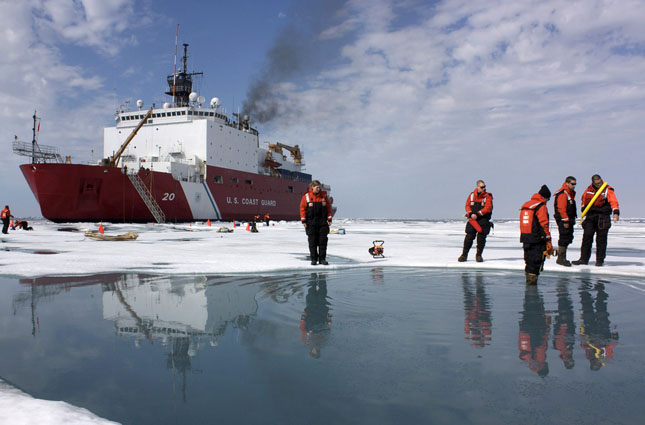-
Obama Highlights Long-Term Climate Security Threats, Releases Review of Federal Resources
May 20, 2015 By Schuyler Null
In a commencement speech at the U.S. Coast Guard Academy today, President Obama said “climate change constitutes a serious threat to global security, an immediate risk to our national security, and, make no mistake, it will impact how our military defends our country.”
“Climate change will shape how every one of our services plan, operate, train, equip, and protect their infrastructure”Rising sea levels, storms, droughts, wildfires, and melting permafrost are already damaging military facilities and affecting training, he said. One foot of sea-level rise could cost the United States $200 billion by the end of the century, including inundating critical transportation and energy infrastructure.
“You are part of the first generation of officers to begin your service in a world where the effects of climate change are so clearly upon us,” Obama told graduates. “Climate change will shape how every one of our services plan, operate, train, equip, and protect their infrastructure, today and for the long term.”
One of the most significant ways climate change could affect the Coast Guard’s mission is by opening up the Arctic. “We are witnessing the birth of a new ocean,” Obama said. More ship traffic is expected, thanks to melting sea ice and the potential for oil and gas exploitation. But the Coast Guard has only one icebreaker which is 39 years old and nearing retirement. To increase capacity for search and rescue and other missions, numerous committees and experts, including the National Research Council, have recommend funding for the development of replacements, which can take decades, to no avail so far.
The White House also announced a brief review of federal literature on the security implications of climate change, outlining recent roadmaps and assessments by various agencies, from the Department of Homeland Security’s domestic plans to intelligence assessments. It calls climate change a “threat multiplier” that when combined with growing populations, poverty, social tensions, scarcity, and political instability “can enable terrorist activity and other forms of violence.” Obama specifically called out violence in Nigeria and Syria as potentially related to climate change.
It’s unusual to see such a report coming from a Combatant CommandThe review is a good reminder of how much federal action there has been on climate change over the last few years. The fact that U.S. Central Command produced a climate change assessment in 2014, for example, is fascinating. It makes sense – Central Command coordinates U.S. military assets for the Middle East, North Africa, and Central Asia, an already drought-prone and resource-scarce region – but it’s also unusual to see such a report coming from one of the Combatant Commands, which rarely produce research.
The review does have one notable absence: the Department of State’s Quadrennial Diplomacy and Development Review. Released last month, Secretary Kerry’s narrative for U.S. foreign policy made addressing climate change and its effects on national security a major theme for the Department of State and USAID. The very first QDDR, under Secretary Clinton, also featured climate change and called for “elevating civilian power” as an equal alongside the U.S. military. Judging by the absence of State and USAID resources in the review, however, which tend to focus more on the human security aspects of climate change, it seems there’s still some convincing to do about their place at the table.
Sources: National Research Council, Rolling Stone, U.S. Department of Defense, U.S. Department of State, The White House.
Photo Credit: A research mission to the Chukchi Sea using the U.S. Coast Guard icebreaker Healy in 2010, courtesy of Kathryn Hansen/NASA.
Topics: Arctic, climate change, conflict, environment, environmental security, featured, foreign policy, Middle East, military, Nigeria, oceans, QDDR, QDR, security, State, Syria, U.S., USAID
 A Publication of the Stimson Center.
A Publication of the Stimson Center.



